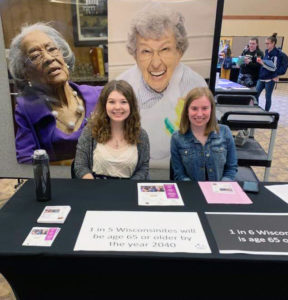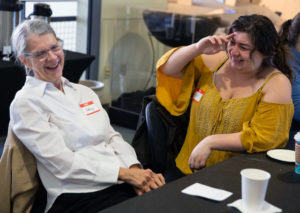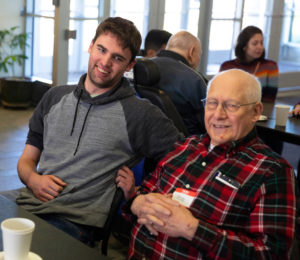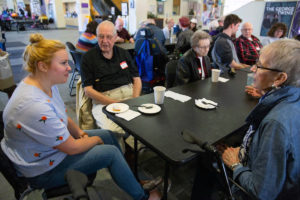Innovative Project GREY Helps University of Wisconsin-Whitewater Students Learn from their UCC-related Fairhaven Senior Services Elders

Posters like these, featuring retired professor Dr. Fannie Hicklin (the poster on the left) and Fairhaven resident Doris Willis (the poster on the right), cropped up all over the UW-Whitewater campus this past spring. Here, Project GREY student research assistants Malayna Oswald and Cloie Rose prepare to engage the student passersby.
This past spring, images started appearing across the Whitewater campus of the University of Wisconsin. But these weren’t the normal fare of athletic events and other student pursuits. Instead, they were large posters featuring older adults from the local community, including some former university professors.
The posters are the first part of Project GREY (Geriatric Resources for Engaging Your Students), a unique program based on the partnership between the university and nearby Fairhaven Senior Services. Thanks to an $85,000 grant from Milwaukee-based Bader Philanthropies, the program kicks off in high gear during the 2019-2020 school year.
“Project GREY is a one-year aging awareness and curriculum enhancement program designed to get more students across disciplines interested in pursuing coursework or careers in aging,” says Jeannine Rowe, associate professor of social work. “In partnership with Fairhaven Senior Services, the project provides greater opportunities for students to interact with older adult community members through planned on-campus activities [and] through community-based learning courses in aging in which students work directly with Fairhaven to support community elders’ needs.”

Fairhaven resident Kathy Ross shared a laugh with a UWW student during a Sit and Sip gathering.
The posters have spurred “lots of discussion among the students about the posters and the information included on them,” Rowe says. In addition to the posters, the first part of the project included “sit and sips,” where students met with older adults on campus to enjoy coffee, pastries, and conversation. In May, 100 students met with Fairhaven residents to make more than 2,500 dog biscuits for area dog shelters.
The combination has created “questions about the Fairhaven residents coming to campus, and our many flyers and promotional materials are drawing students to many Project GREY events” she adds.
During the 2019-2020 academic year, two Fairhaven-based courses — which students sign up for like any other college course — will focus on keeping older adults engaged. Taught mostly at Fairhaven, one class will center on a student-facilitated “TimeSlips” program, a creative storytelling exercise with groups of Fairhaven residents.
Project GREY was developed in response to the growing aging population in Wisconsin, where currently, one in six adults is 65 or older, a statistic that is expected to become one in five over the next 20 years. The project is an attempt to alter the lack of students pursuing careers in aging, including health care and the social and behavioral health industries. The project hopes that “by raising awareness about issues related to aging, including greater awareness of the workforce shortage, and offering students more opportunities to engage with older adult community members, we will enhance students’ interested in aging-related careers,” Rowe adds.

Fairhaven resident Peter Goihl enjoyed his time spent with a UWW student during a spring Sit and Sip.
The Project GREY team includes Rowe; Yeongmin Kim, professor of social work; Brian Robinson, Fairhaven’s director of leisure services; and six undergraduate Research Apprentice Program students — Malayna Oswald, Jennifer Schmidt, Jeta Dehari, Cloie Rose, Sam Giles, and Stephanie Mepham. Rowe says she’s encouraged that the project is gaining traction.
“The project appears to have a wider reach — more than just students,” she says. “Many university faculty, staff, and administrators have inquired about Project GREY and expressed interest in finding ways to partner with the project. There is great recognition among the university community regarding the need to grow the workforce in aging.”
The partnership between the Whitewater campus and Fairhaven is not new, but has been strengthened in recent years, says Robinson. Thanks to the partnership, “we now have a thriving volunteer program and countless athletic teams, classes, professors, student groups and organizations” that regularly visit. “To highlight one relationship: the women’s volleyball team has come over every single month, during season and out of season, for the past three years.”
The largest benefit of Project GREY and the UW-Whitewater partnership for Fairhaven residents is “the intergenerational experiences,” Robinson says. “Visits from the University have become so frequent that the residents are extremely comfortable with the students, and often times are the ones leading the conversations. The residents truly enjoy listening to the students and hearing about their lives, and what they are going through as a student — giving advice here and there.”

Gaylon and Hannah Greenhill are two of the Fairhaven residents participating in Project GREY. During this Sit and Sip, they conversed with graduate student Emily Naumann.
Both Rowe and Robinson see Project GREY as fostering greater understanding among the students about older adults in their community.
“Fairhaven provides an opportunity for the students to visit with the older adult population and maybe change some stereotypes they have about coming into a setting like this,” Robinson says. “For some students, this also helps them break out of their comfort zone and grow in life.”
Rowe agrees, and hopes the experience creates a greater desire among the students for geriatric-related career choices. With more than 1,500 students reached through the program, “the response to the program appears to be well-received by many students,” she says.
“We hope that Project GREY will reduce negative perceptions among students about aging, enhance their knowledge about some of the factors associated with aging, and make aging relevant to their lives,” Rowe adds. “Most importantly, we hope that more students will demonstrate an interest in pursuing careers in aging.”
Join Our Mailing LIst
"*" indicates required fields
Follow on Facebook
Cedar Community and the West Bend Theatre Company Announce Partnership - CHHSM
www.chhsm.org
Cedar Community in West Bend, Wis., and the West Bend Theatre Company (WBTC) announce recently that they will continue their partnership in the 2025 season. Following a highly successful run of Char...